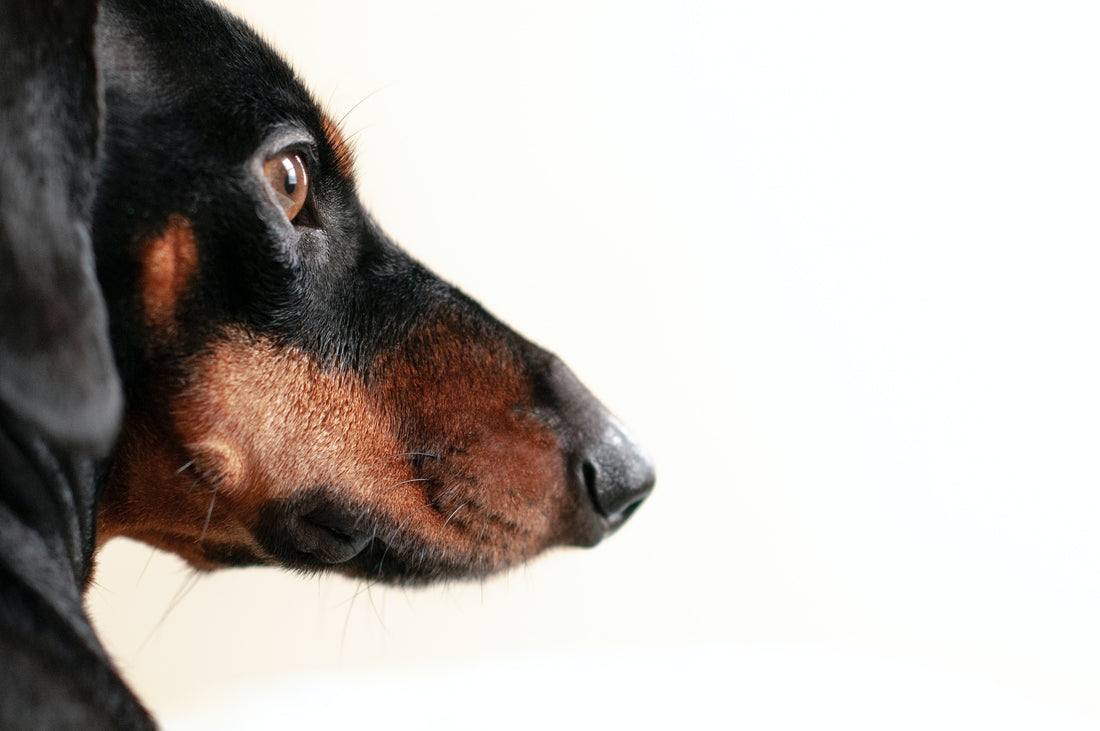Dachshunds are a popular breed!
Shaped like a hotdog on short legs, with floppy ears and big eyes, they’ve certainly got the cuteness factor going for them!
But many of us are unaware of the potential health-related issues we may face when adopting this adorable dog.
Because of their unique body shape, (long back and short legs), Dachshunds have the highest risk of any other breed for developing back problems, predisposing them to Intervertebral disc disease, known as IVDD.
How does IVDD affect Dachshunds?
Although IVDD can strike any dog, Dachshunds top the list.
Many people are surprised to learn that something as simple as letting your Doxie jump on and off the couch can have serious repercussions. Even more surprising is, it can happen quickly, meaning not necessarily from years of repetitive movements, but simply from just one bad landing.

Unfortunately, by the time most people realize there’s a problem, their dog is already experiencing pain and mobility issues, making treatment and recovery much more difficult.
Symptoms and Signs of IVDD in Dachshunds
Although symptoms may vary depending on the severity and location of the affected disc, they typically include the following:
- Mobility problems, including limping, stiffness, and lameness in hind legs
- Signs of pain including yelping and whining
- Walking with a wobbly gait, and/or a hunched posture
- A lack of coordination
- Difficulty standing for any length of time
- Paralysis of back legs
- Loss of bladder control

Along with these symptoms, a dog experiencing pain may also show changes in mood and behavior. They may be lethargic, have a lack of interest in their normal activities, including playing, daily walks, and even eating.
The Importance of Preventing Back Injuries in Dachshunds
When it comes to Dachshunds, the dog breed most predisposed to IVDD, preventing back injuries is crucial.
Unfortunately, because IVDD is not very widely known about, many owners do not learn of the precautions until after the damage has been done.
And while IVDD typically occurs from repetitive minor injuries that over time weaken the spine, causing disc degeneration, it can also develop suddenly due to an acute injury, including something as simple as jumping off the couch.
The Top 2 Ways to Prevent Back Problems in Dachshunds
1. Weight Control
For dogs prone to back problems, keeping them at a healthy weight is the most effective way of preventing a potential disk injury.
2. Prevent Jumping Up or Down
Whether snuggling on the couch, going for a ride in the car, or sharing our beds, most of us enjoy having our dogs by our side. But when it comes to Dachshunds, as well as all dogs with a similar body type, providing accommodations to make sure they cannot jump up, and more importantly, jump down, is crucial. This type of repetitive movement causes the discs along the spine to compress, putting them at risk of rupturing.

If picking your dog up is not possible, because maybe you don’t want to injure YOUR back, using pet ramps or stairs is a great option to allow them access to your bed, couch, or car.
Disc and Spine Support Supplements
Disc and Spine Chews for Dogs were developed specifically to provide back and neck support by combining beneficial supplements and vitamins essential for normal spine and disc function.
The combination of ingredients in these chews work together to reduce inflammation while promoting healthy connective tissues and nerve function needed for spine stability and mobility.

Glucosamine helps support healthy development of cartilage to slow joint and disc deterioration
Ascorbic acid (Vitamin C) is incredibly instrumental in restoring and repairing body tissues
MSM provides a natural anti-inflammatory to reduce swelling of discs and joints
Chondroitin helps to reduce stiffness and pain
Turmeric fights inflammation to improve circulation and boost immunity
L-Taurine, an amino acid found in the spinal cord, can help support nerve growth
In writing this blog, we hope to raise awareness for pet owners about the high risk of IVDD in dogs with a long back and short legs, and how taking precautions is key in preventing this disease and keeping your dog happy and healthy.
Products related to this article:
Every Sale Supports a Shelter Pet. Learn More.
Made in Vermont. Learn More.
If you suspect your pet is sick, call your vet immediately. For health-related questions, always consult your veterinarian, as they have examined your pet, know the pet's health history, and can make the best recommendations for your pet.




